Effective Techniques for Clearing Shower Drains
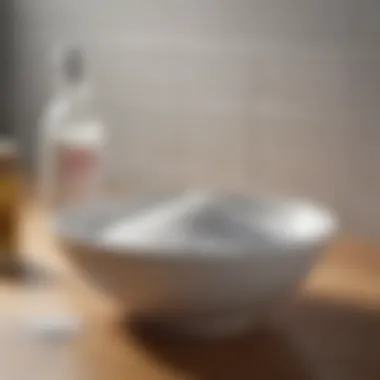
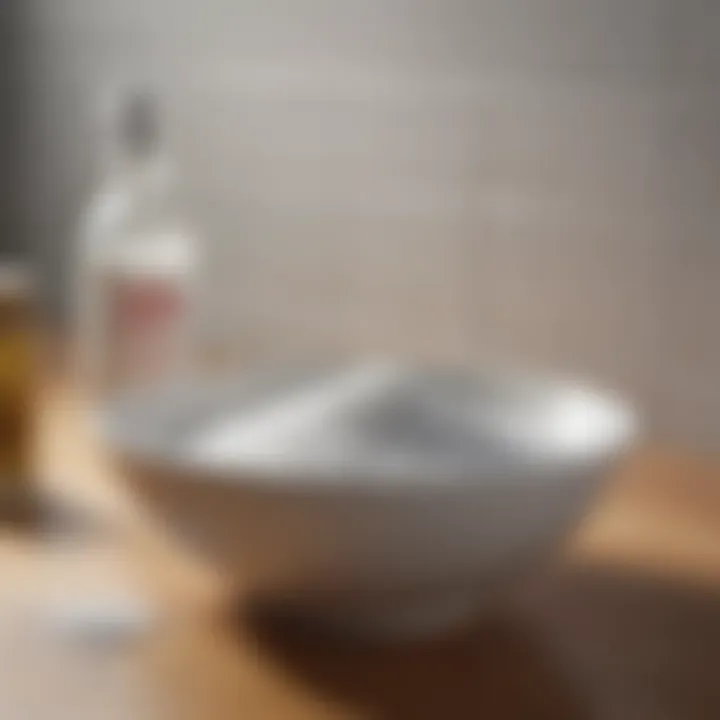
Intro
Shower drains, though often overlooked, play a vital role in our daily routines. When they become clogged, they impede functionality and can lead to larger plumbing issues. Traditional chemical cleaners may seem like a quick solution, but they can be harsh on both the environment and your plumbing. Instead, an effective and eco-friendly alternative exists: baking soda and vinegar. This method is not only safe but also accessible to all homeowners. In the following sections, we will explore the effectiveness of this natural remedy, discussing the underlying principles at play, step-by-step instructions for use, and variations for different types of clogs.
The process is enjoyable and provides a sense of accomplishment. Homeowners can maintain their drains while also caring for the environment, aligning with sustainable living practices. Let's delve into the specific techniques that make baking soda and vinegar a powerful combination for clearing shower drains.
Prologue to Shower Drain Maintenance
Maintaining shower drains is an essential aspect of home care that often gets overlooked. A fully functional drain system is vital for hygiene and aesthetics, ensuring that water flows efficiently without causing any unpleasant odors. It is important to grasp how factors like hair, soap buildup, and mineral deposits contribute to common drain issues. By understanding these problems, one can proactively address them before they escalate into more significant concerns.
Overview of Common Drain Problems
Blocked shower drains are a frequent nuisance. Hair strands, soap residue, and even small objects can accumulate over time, leading to slow drainage or complete blockage. This inconvenience can be frustrating and can contribute to larger plumbing issues if not addressed soon. Additionally, foul smells can emanate from standing water, further complicating the situation.
Another common problem is the buildup of mineral deposits, particularly in areas with hard water. These deposits can create additional layers of blockage, complicating the cleaning process. Recognizing these problems early is crucial for maintaining drain functionality.
Importance of Regular Drain Cleaning
Regular cleaning of shower drains has numerous benefits. It not only helps in preventing clogs but also aids in prolonging the life of your plumbing system. A clean drain minimizes the risk of damage caused by long-term blockages. Furthermore, regular maintenance enhances the hygiene of your home, reducing the likelihood of mold and mildew growth, which can occur in stagnant water.
In most cases, employing simple, eco-friendly methods like baking soda and vinegar can be effective in maintaining drain cleanliness. It offers a low-cost solution that aligns with sustainable living practices. By incorporating these techniques into your routine, you ensure that your shower drains remain functional and your living space remains pleasant.
The Science Behind Baking Soda and Vinegar
Understanding the science behind baking soda and vinegar illuminates their effectiveness as a cleaning solution, particularly for shower drains. This knowledge empowers homeowners to use simple, household items to tackle plumbing issues without harmful chemicals. By exploring the fundamental chemical principles at play, you can appreciate why this duo is both potent and eco-friendly.
Chemical Reactions Explained
Baking soda, or sodium bicarbonate, is a mild alkaline compound. When mixed with vinegar, which is acidic due to its acetic acid content, a chemical reaction occurs. This reaction produces carbon dioxide gas, water, and sodium acetate.
- As the baking soda dissolves in the vinegar, it releases bubbles.
- These bubbles effervesce and create agitation in the drain, which helps remove debris and buildup.
Ultimately, through this reaction, the combination breaks down gunk in the pipes, making it easier for water to flow freely. This is a safe and effective method to clear minor clogs.
Why They Are Effective for Clogs
Baking soda and vinegar are effective for several reasons. First, the natural abrasive properties of baking soda help to scrub away buildup. When combined with the bubbling action of vinegar, this scrubbing action becomes significantly more potent.
Moreover, using baking soda and vinegar:
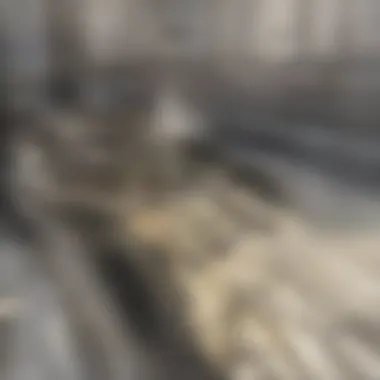

- Reduces the need for harsh chemicals that can harm the environment.
- Is cost-effective compared to industrial cleaners, making it accessible to most households.
- Leaves no toxic residue that may linger in your home, ensuring cleaner air quality.
In summary, the chemical interactions between baking soda and vinegar not only provide a practical solution for maintaining clear shower drains but also emphasize the importance of sustainable cleaning practices. This knowledge aids homeowners in making informed choices about their cleaning habits.
Preparing for the Cleaning Process
Before diving into the actual cleaning of your shower drain, it is vital to prepare adequately. This preparation serves multiple purposes. First, it ensures that you have everything you need at your fingertips, allowing for a streamlined cleaning process. Second, it helps you mitigate potential risks that could arise during the cleaning. An organized approach not only saves time but also enhances the overall effectiveness of the treatment you will use.
Gathering Necessary Materials
To clear a drain effectively using baking soda and vinegar, you need specific items. The following list outlines what is necessary:
- Baking Soda: A common household item that acts as a mild abrasive.
- White Vinegar: An acidic liquid that helps dissolve buildup.
- Boiling Water: Useful for flushing any remaining debris.
- Measuring Cup: For accurate quantities of the materials.
- Cloth or Plug: To cover the drain temporarily during the reaction.
Each of these materials plays a key role in ensuring that the baking soda and vinegar can work together effectively. Having everything ready allows you to follow the process without interruptions, enhancing focus and efficacy.
Safety Precautions to Consider
Safety is paramount when dealing with any cleaning project. When using baking soda and vinegar, the reactions are generally safe, but there are practical considerations to keep in mind:
- Wear Gloves: Protect your skin from the acidity of vinegar and the roughness of baking soda.
- Ventilation: Ensure your bathroom is well-ventilated to avoid any potent smells.
- Avoid Mixing with Other Chemicals: Do not combine vinegar and baking soda with other drain cleaners, as this could create harmful reactions.
- Check for Loose Fittings: Ensure that all your drain covers and fittings are secure to prevent any accidents.
Following these precautions will help ensure that your cleaning process is both simple and effective, without unnecessary risks. By laying the groundwork properly, you are setting yourself up for a successful outcome.
Step-by-Step Guide to Clear the Drain
A systematic approach is essential when addressing blocked shower drains. The clarity of a step-by-step guide facilitates understanding and execution of the cleaning process. This article emphasizes the relevance of each phase, helping homeowners maximize the effectiveness of baking soda and vinegar in clearing drains.
Initial Assessment of the Drain
Before applying any cleaning technique, it is crucial to assess the drain’s condition. Observing the nature and severity of the blockage can inform your approach. Look for:
- Surface buildup: Hair and soap residue on top of the drain may indicate a partial blockage.
- Water flow: If water stagnates, it suggests a significant clog.
- Odors: Foul smells can signal decomposed organic matter within the pipes.
By understanding the blockage's specifics, you prepare for an efficient cleaning intervention. Identify if it is a minor problem that can be solved at home or something more severe that needs professional attention. This assessment provides the groundwork for subsequent cleaning steps and influences decisions on techniques and materials needed for resolution.
Application of Baking Soda and Vinegar
Once you complete the assessment, you can move to the cleaning phase. The application of baking soda and vinegar occurs in two distinct stages, and both are important for effectiveness.
- Baking Soda Introduction: Pour about one cup of dry baking soda directly into the drain. This compound serves as a mild abrasive and helps neutralize odors.
- Vinegar Activation: Follow up immediately with one cup of white vinegar. The interaction between baking soda and vinegar initiates a chemical reaction. This reaction produces carbon dioxide, generating bubbles that can help dislodge embedded debris within the pipes.
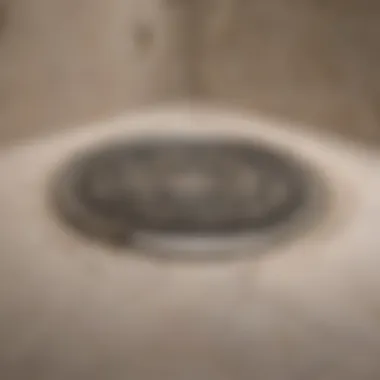
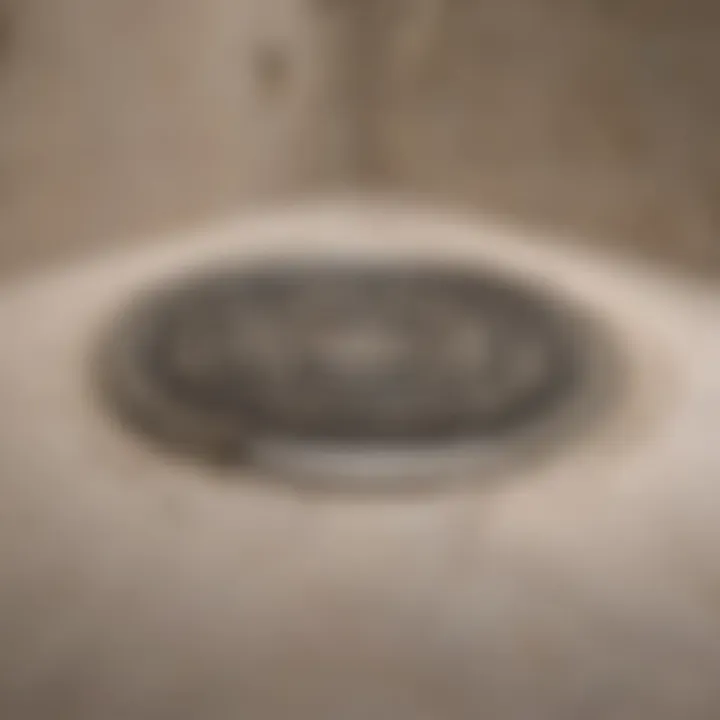
Allow this mixture to sit for approximately 30 minutes. During this time, the combination breaks down the substances clogging the drain. Using a pot or kettle, heat water to boiling point while the mixture settles. This boiling water will assist in flushing the loosened particles through the drain afterward.
Rinsing and Follow-Up Checks
After the waiting period, it is essential to rinse the drain thoroughly. Pour the boiling water down the drain in a slow, steady stream. This step will help wash away the residue left by the baking soda and vinegar. A successful rinse will clear up the pipes and ensure optimal water flow.
Next, perform follow-up checks to confirm drain efficacy:
- Check for remaining odors or water backflow. If smells persist or the water does not drain adequately, the clog may still exist deeper in the plumbing.
- Consider redoing the process. If necessary, repeat the baking soda and vinegar application.
- Observe future water flow. Ensure that the shower continues to drain well over the next few days. If recurring clogs arise, it might be necessary to explore other remedies or consult a professional.
"Routine maintenance not only clears current clogs but also helps prevent future blockages."
Dealing with Persistent Clogs
Addressing persistent clogs in shower drains is crucial for maintaining both functionality and hygiene in your bathroom. Often, standard methods such as using baking soda and vinegar may provide temporary relief but sometimes fail to resolve the issue entirely. Understanding when to pursue further action can save you time and hassle later. Moreover, persistent blockages could indicate deeper infrastructure problems, which require a more thorough approach.
When to Seek Professional Help
Professional assistance should be considered when household techniques do not remedy the problem. Signs that you should call in an expert include:
- Frequent backups or slow drainage: If you notice the water consistently has difficulties draining, the blockage could be more serious, possibly involving your main sewer line.
- Unpleasant odors: A lingering odor can signal that waste is stuck in the pipes, potentially leading to more significant problems if not addressed quickly.
- Repeated need for treatment: If you find yourself reaching for baking soda and vinegar repeatedly over a short period, this could be a sign that you need a professional assessment.
In such cases, trained plumbers possess tools such as hydro-jetting and camera inspections that can effectively identify and resolve complex issues within your plumbing system.
Alternative Remedies to Consider
If you prefer not to use professional services immediately, several alternative methods can help address persistent clogs:
- Salt and hot water: Mixing salt with hot water can create a potent solution that might help dissolve grease and build-up within the drain.
- Dish soap and hot water: Pouring a cup of dish soap down the drain followed by a pot of hot water can lubricate any stubborn debris, making it easier for it to move along the pipe.
- Plumber's snake: This tool can physically break up clogs that chemical methods cannot address. A plumber's snake is an effective way to reach deep-seated blockages.
Using alternative remedies may provide a temporary fix but be diligent about monitoring the drain. If these methods fail, contacting a professional should be your next step to avoid any further issues.
Long-Term Drain Maintenance Strategies
Maintaining a clean and functional shower drain should not be viewed merely as a reactionary task. Instead, it is vital to adapt a proactive approach to drain care. Implementing long-term drain maintenance strategies can prevent the buildup of clogs and reduce the likelihood of requiring emergency interventions, which often come at a higher cost. Taking time to engage in regular cleaning routines can also extend the lifespan of plumbing systems, ultimately ensuring that the plumbing remains effective and efficient over time.
Routine Cleaning Recommendations
Engaging in routine cleaning of your shower drain is an often-overlooked task, yet it can have significant payoffs. Here are practical recommendations for cleaning your shower drain:
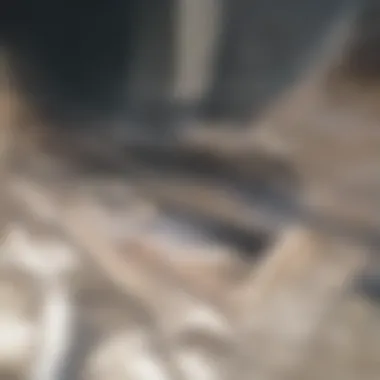
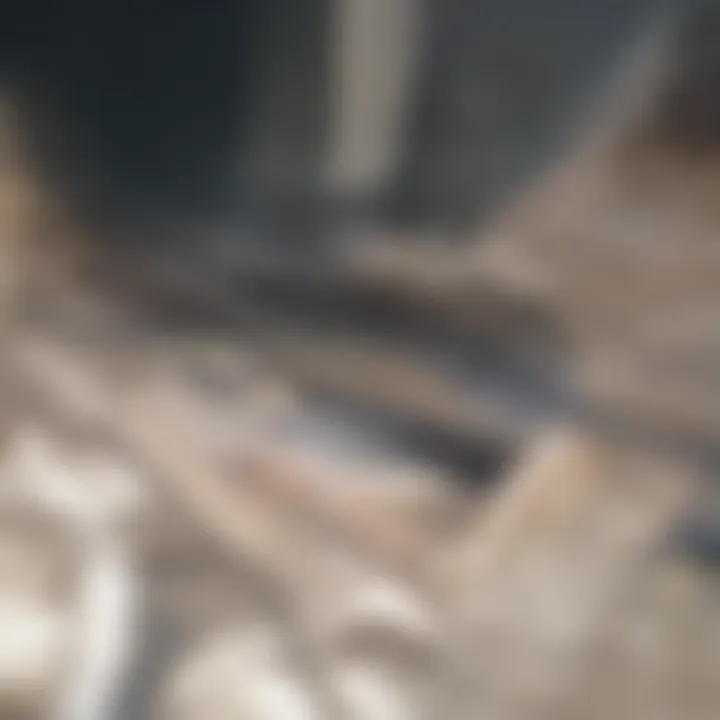
- Frequency: Aim to clean your drain every few weeks, especially if you have long hair or notice soap scum buildup. Regular attention can prevent potential blockages before they materialize.
- Basic Cleaning Supplies: Gather some essential materials such as a plunger, a drain snake, baking soda, and vinegar. These are often effective and accessible options for home cleaning.
- Daily Maintenance: After each shower, make it a practice to rinse the drain with hot water. This can help to wash away any lingering soap residues and hair strands before they accumulate.
- Weekly Deep Clean: Once a week, consider using a combination of baking soda and vinegar. This mixture, when poured down the drain followed by hot water, can help break down mineral deposits and clean off any greasy residues. The natural effervescence is not only effective but also environmentally friendly.
Professional Services for Regular Maintenance
Although many homeowners feel comfortable tackling minor drain issues themselves, persistent or complex problems may necessitate professional intervention. Here are some key considerations for hiring professional drain cleaning services:
- Preventive Inspections: Many plumbing professionals offer routine inspections. These can pinpoint weaknesses or potential clogs early in their formation.
- Advanced Techniques: Professionals utilize advanced equipment not typically available to the layperson. Hydro-jetting and specialized snakes can clear drains much more effectively than standard home methods.
- Expertise: Plumbers have the knowledge to identify not just the symptoms, but the root causes of drain problems. This can prevent recurring issues and may lead to alternative solutions that a homeowner may not know about.
- Long-Term Cost Benefits: Engaging professionals for regular maintenance can save money in the long run. Avoiding the high costs associated with emergency repairs is crucial for budget management.
Environmental Impact of Cleaning Choices
In discussing the effectiveness of using baking soda and vinegar for clearing shower drains, it is crucial to consider the environmental impact of cleaning choices. The choice of cleaning products not only affects household health but also has broader implications for local ecosystems. Eco-friendly cleaning solutions such as baking soda and vinegar are not just effective; they are also less harmful to the environment compared to conventional chemical cleaners. This section explores the benefits of choosing eco-friendly products and strategies for reducing the use of harsh chemicals in your home.
Benefits of Eco-Friendly Products
Using eco-friendly products offers several advantages. First, they often come from natural ingredients, which means they are generally safer for indoor air quality. Chemical cleaners can release volatile organic compounds (VOCs) that may contribute to respiratory issues and other health problems. By opting for baking soda and vinegar, homeowners protect their families from exposure to potentially toxic substances.
Additionally, eco-friendly products minimize environmental pollution. Traditional chemical cleaners may contain substances that can be harmful to aquatic life when they enter the water system. In contrast, baking soda and vinegar break down naturally and do not persist in the environment. This contributes to healthier waterways and less strain on wildlife.
Some specific advantages include:
- Safety: Less risk for children and pets.
- Biodegradability: More sustainable options that break down without harming the environment.
- Cost-effective: Often cheaper than commercial products designed for similar jobs.
Reducing Chemical Usage in the Home
Minimizing chemical usage is essential for maintaining not only a cleaner home but also a better planet. The first step towards achieving this is to replace conventional cleaning agents with natural alternatives like baking soda and vinegar. These two ingredients work well in various cleaning tasks beyond just clearing drains. For example, they are effective for scrubbing surfaces, deodorizing, and even laundry.
By using these natural products, homeowners can significantly cut down on the number of synthetic chemicals in their living spaces. The goal of reducing chemical usage can be achieved through the following methods:
- Educating oneself: Understand what ingredients are in conventional cleaners and how they can be harmful.
- DIY solutions: Create homemade cleaning products using simple ingredients. This practice can lead not only to safer home environments but also to cost savings.
- Choosing wisely: Select eco-friendly products when purchasing cleaning supplies. Look for certifications or labels that indicate a product is environmentally friendly.
"Transitioning to eco-friendly cleaning practices is not just about cleaning the home, but also about protecting the planet."
Overall, the environmental impact of cleaning choices is significant. Using baking soda and vinegar not only provides effective solutions for drain maintenance but also fosters a healthier living environment and contributes to a sustainable future. By integrating such practices into daily life, individuals can make a meaningful difference.
Epilogue and Final Thoughts
Summary of Key Points
- Baking Soda and Vinegar Reactions: The chemical reactions between baking soda and vinegar provide natural cleaning solutions. The effervescence helps break down debris, making it easier to clear drains.
- Step-by-Step Application: A systematic approach is vital. It includes assessing the drain, applying the ingredients in the correct order, and rinsing thoroughly to ensure complete removal of debris.
- Long-Term Maintenance: Adopting good maintenance practices can reduce the frequency of clogs. Regular cleaning using these eco-friendly ingredients is effective and promotes sustainability.
- Professional Help: Knowing when to consult a professional can save time and prevent extensive damage to plumbing systems.
"Choosing eco-friendly options like baking soda and vinegar can lead to a more sustainable home environment while addressing common household issues."
Encouragement for Sustainable Practices
It is essential to encourage sustainable practices when it comes to household cleaning. Selecting eco-friendly products like baking soda and vinegar ensures that individuals contribute positively to the environment. By reducing the use of chemical-laden cleaners, you not only improve indoor air quality but also minimize the risk of harmful residues in the waterways. Homeowners are urged to adopt these methods as part of a broader commitment to sustainability.
Engaging in regular maintenance is another way to promote responsible practices. It is about creating habits that support both functionality and eco-friendliness. By committing to the techniques discussed, individuals can maintain clean drains while also fostering a healthier ecosystem.







